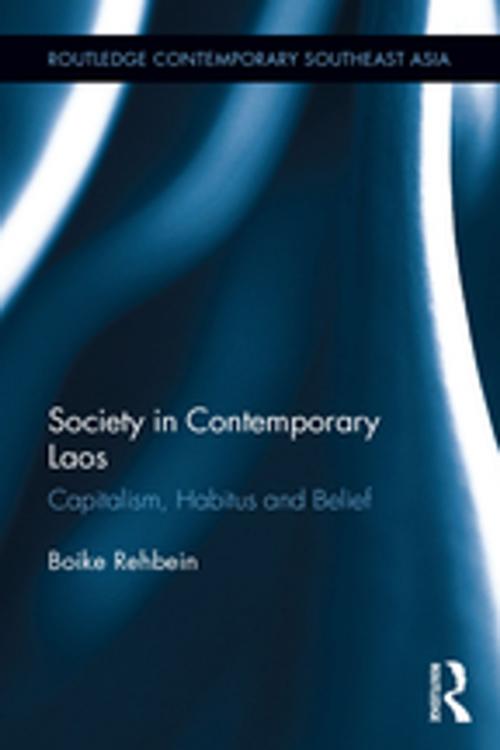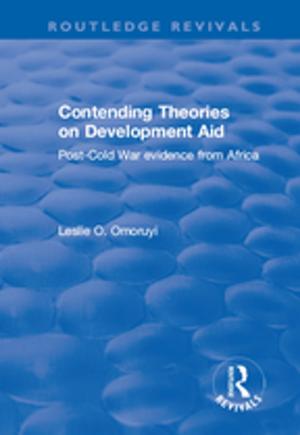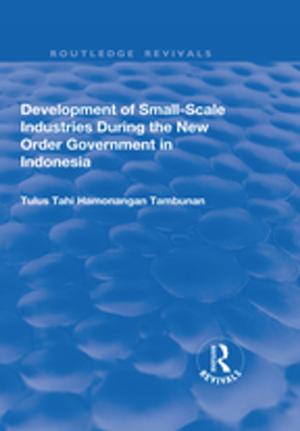Society in Contemporary Laos
Capitalism, Habitus and Belief
Nonfiction, Social & Cultural Studies, Social Science, Cultural Studies, Ethnic Studies| Author: | Boike Rehbein | ISBN: | 9781351859349 |
| Publisher: | Taylor and Francis | Publication: | April 21, 2017 |
| Imprint: | Routledge | Language: | English |
| Author: | Boike Rehbein |
| ISBN: | 9781351859349 |
| Publisher: | Taylor and Francis |
| Publication: | April 21, 2017 |
| Imprint: | Routledge |
| Language: | English |
Over the past decade, Laos’ exposure to global capitalism has resulted in extensive economic and social transformations. Precapitalist social structures both persist and are transformed into a particular configuration of classes. This entails increasing social inequality, a widening range of habitus and new forms of ethos.
This book pursues the theoretical aim of shedding light on the old question raised by Max Weber about the relation between capitalism, ethos and society. The empirical study consists of a description of the social structures, their embodiment in the habitus and world-views in Laos against the background of a critical revision of Pierre Bourdieu’s sociology. To achieve these aims, the author develops a qualitative methodology as neither Weber nor Bourdieu explained how to empirically study habitus and ethos. The empirical material for the book was gathered over a period of more than five years and comprises several hundred life-course interviews in all sections of Lao society as well as a representative quantitative survey. The author argues that precapitalist social structures persist and continue to shape the social fabric of contemporary Laos. At the same time, they are transformed by global and local capitalism. The book shows how the hierarchies contained in each structure shape the habitus of the Lao population and how these in turn influence the development of a capitalist and a religious ethos. The argument makes use of Pierre Bourdieu’s sociology and adapts it to the setting of Laos by introducing new as well as indigenous concepts. While social structure, habitus and beliefs are subject to a capitalist transformation and unification, the newly emerging classes and milieus are not copies of Western forms but retain their local history.
Filling a gap in the literature on Laos and offering new perspectives on core concepts such as habitus, class, lifestyle, work ethic and its religious underpinnings, this book will be of interest to academics in the fields of Sociology, Religious Studies, and Southeast Asian Studies.
Over the past decade, Laos’ exposure to global capitalism has resulted in extensive economic and social transformations. Precapitalist social structures both persist and are transformed into a particular configuration of classes. This entails increasing social inequality, a widening range of habitus and new forms of ethos.
This book pursues the theoretical aim of shedding light on the old question raised by Max Weber about the relation between capitalism, ethos and society. The empirical study consists of a description of the social structures, their embodiment in the habitus and world-views in Laos against the background of a critical revision of Pierre Bourdieu’s sociology. To achieve these aims, the author develops a qualitative methodology as neither Weber nor Bourdieu explained how to empirically study habitus and ethos. The empirical material for the book was gathered over a period of more than five years and comprises several hundred life-course interviews in all sections of Lao society as well as a representative quantitative survey. The author argues that precapitalist social structures persist and continue to shape the social fabric of contemporary Laos. At the same time, they are transformed by global and local capitalism. The book shows how the hierarchies contained in each structure shape the habitus of the Lao population and how these in turn influence the development of a capitalist and a religious ethos. The argument makes use of Pierre Bourdieu’s sociology and adapts it to the setting of Laos by introducing new as well as indigenous concepts. While social structure, habitus and beliefs are subject to a capitalist transformation and unification, the newly emerging classes and milieus are not copies of Western forms but retain their local history.
Filling a gap in the literature on Laos and offering new perspectives on core concepts such as habitus, class, lifestyle, work ethic and its religious underpinnings, this book will be of interest to academics in the fields of Sociology, Religious Studies, and Southeast Asian Studies.















